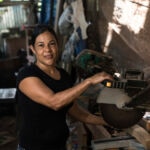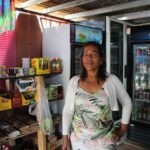Women and health: the privilege of having a microinsurance policy in Latin America
The many manifestations of COVID-19 have made us susceptible to associating any of its wide-ranging symptoms to the virus and we forget that other conditions still exist and need to be tended to. More worrisome is the fact that globally, public health measures to control the pandemic, including mobility restrictions and prioritization of COVID-19 treatment, coupled with the economic crisis that is producing an increase in poverty, has made it even more challenging for low-income patients to access treatment in a timely manner. In Latin America, according to Pfizer, the number of medical consultations and oncological visits nearly halved. Moreover, in the region, having medical coverage and access to basic health care is limited to very few people.

In pre-COVID-19 times, a Pan American Health Organization/World Health Organization study signaled that approximately 21% of Latin Americans did not seek care because of geographical barriers and 30% did not have access to health care for economic reasons. This reality is compounded by existing gender inequalities in the region, given that 59% of women rely on informal jobs, on average have lower incomes and most lack access to social benefits like health insurance.
Unfortunately, this is the reality for many of the 1.5 million low-income women entrepreneurs that the BBVA Microfinance Foundation (BBVAMF) serves in five Latin American countries. Over the last few years, BBVAMF’s microfinance institutions (MFI) have started developing, in collaboration with insurance brokers, innovative health insurance policies and basic health assistance, with broad coverage, ranging from serious illnesses like alzheimers and cancer to medical attention for their families, in order to help our entrepreneurs mitigate hardships and boost their wellbeing, inherent to our purpose.
In Panama, BBVAMF’s MFI, Microserfin, conducted a baseline study and found that 28% of urban women clients don't go to medical check-ups. Moreover, 35% self-medicate and only 16% count on a private health insurance plan. To circumvent this gap in access and use, the MFI offers different types of health assistance products, including one specially tailored for the aforementioned segment. Interestingly though -or not- since women reinvest up to 90% of their income back into their families, only 4% of urban women chose this product, favoring a family plan to cover the needs of their kin as well.
Due to informality and a low-income, Ana Jaramillo, a Panamanian single-mother and store owner, was forced to either pay high fees at private clinics or navigate collapsed public hospitals but through her loan with Microserfin, she is able to improve care for her daughters and herself, “when they offered me the assistance, I was shocked. Personally, it is a great initiative and an important benefit in case one falls ill. I never thought I would be able to say that I now have my own health insurance thanks to Microserfin."

Ana Jaramillo, entrepreneur served by the BBVAMF
Similarly in Colombia, Bancamía, BBVAMF’s MFI, together with Mapfre, rolled-out health products specially for women (55% of their client portfolio). Since it’s roll-out in August 2020, almost 27,000 women have taken out a policy oscillating between €0.40 to €3.20 per month. “Today, more than ever, one must be protected. You never know what can happen and I am not exempt from getting sick. The fact that a bank offers this insurance [oncological] is very good because it helps women like me living in the countryside,” asserted Yuli Agudelo, a Colombian Agribusiness entrepreneur.
Both MFIs include 24/7 medical consultations by phone which have been vital during the pandemic. Like mobile banking, 2020 has also seen an acceleration in telehealth solutions that will continue growing to increase financial inclusion and close the access to healthcare gaps, respectively. The BBVAMF will continue to make strides in both these fronts to ensure the sustainable development of the entrepreneurs it serves.
In a year that the world has been forced to pause many things, non-communicable diseases have not; not even for COVID-19. For instance, by 2030, new cases of cancer are expected to increase by 67% in Latin America and the Caribbean, quick actions must be taken to ensure that low-income patients, especially women, are being cared for properly and with dignity.